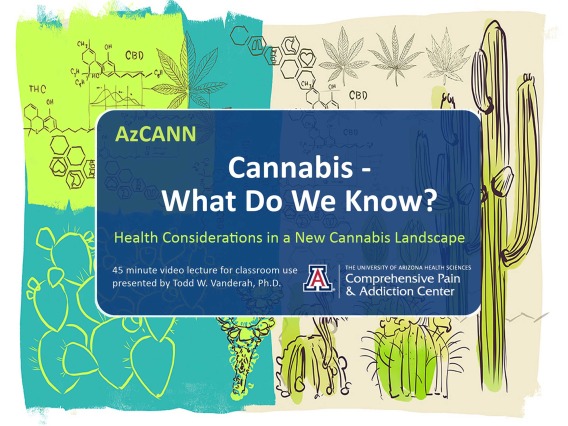Education Arizona Cannabis Education
What do you need to know to make safe and responsible choices for yourself, your family or the communities you serve?
AzCANN (A - Z - CAN) is a community education program. We are responding to the need to educate Arizonans on the state's cannabis laws and provide evidence-based information. The education we provide is centered around the risks, benefits and considerations of recreational and medical cannabis use. Trainings, workshops and video content are tailored for the general public as well as health care and social service professionals and reflect the diverse experiences, cultures and languages in Arizonan communities.
Available Now: 2024 AzCANN Impact Report
Thank you, Arizonans, for contributing to this important work. We are committed to high-quality content informed by the expertise of strategic partnerships and Arizonans. We are an innovative, multidisciplinary team of experts working to synergistically reimagine and transform health care for chronic pain and substance use disorder individuals. We develop and redevelop education and training materials using feedback directly from our intended audiences. From hosting interprofessional education sessions with U of A students to attending local and statewide outreach events, we aim to be the training resource hub for Arizonans interested in medically accurate and innovative cannabis education and research. Together, we empower those of us affected by pain and addiction to thrive.

Educational Videos
Visit our YouTube playlist to watch informational videos. Topics include responsible cannabis use, considerations for health professionals, and tips including how to know when it is safe to drive after cannabis use.
Watch Now

Cannabis FAQs
Get answers to the most frequently asked questions about cannabis law, responsible use, benefits, risks, health and safety, and medical use.
FAQs (in English)
FAQs (in Spanish)

On-Demand Trainings
Training courses, resources and continuing education credits include topics such as chronic pain, cannabis, substance use disorders and other related topics.
Join the AzCANN listserv to receive information about trainings, workshops and educational content updates.
Arizona Poison & Drug Information 24/7 hotline
Available in English and Spanish, translation services available
800-222-1222
Additional Evidence-Based Cannabis Information
www.azmedmj.org
Application information for Medical Marijuana Card
www.azdhs.gov/licensing/medical-marijuana/index.php#qualifying-home
Cannabis Charges Expungement Information
English: azexpunge.org
Español: azexpunge.org/es
Arizona 2-1-1: Discover what resources in Arizona fit your needs
211arizona.org
Health Insurance Help
coverAZ.org/connector
Principal Investigators
Todd W. Vanderah, PhD
Alyssa R. Padilla, MPH
Co-Investigator/Director of Evaluation and Research
Jennifer S. De La Rosa, PhD
Project Manager
Sean P. Cronin
Health Education Coordinators
Lena Cameron
Josué Cruz
Administrative Coordinators
Stephanie Valencia
Victoria Silva
Graphic Design
Erich R. Healy, Instructional Technologist
Advisors
Tally Largent-Milnes, PhD
Mazda Shirazi, MD, PhD
Bridget Murphy, DBH, MEd
If you have questions about cannabis, would like information on trainings, workshops or other project activities, or would like to collaborate with AzCANN, please contact us at:
Comprehensive Center for Pain & Addiction
painandaddiction@arizona.edu
Funder Disclaimer Statement: This program is supported by grant number CTR063305 funded by the Arizona Department of Health Services. The contents are solely the responsibility of the authors and do not necessarily represent the official views of the ADHS.

